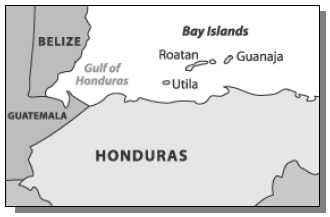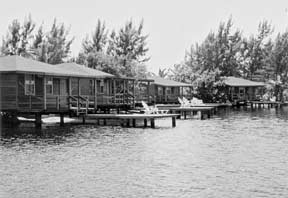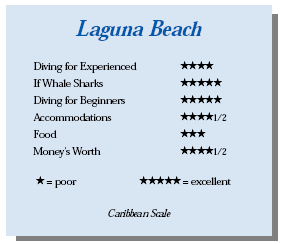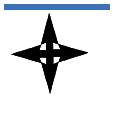Laguna Beach Resort, HondurasContents of this Issue: Is the Inspiration Rebreather a Death Trap? Papua New Guinea Liveaboard Options Haus Poroman Lodge, Mt. Hagen, PNG Aladin Air X Nitrox Computers Recalled The 15-foot octopus is alive and well Editorial Office: Ben Davison Publisher and Editor Undercurrent 3020 Bridgeway, Suite 102 Sausalito, CA 94965 in search of whale sharks from the April, 2003 issue of Undercurrent
Dear Fellow Diver: During three decades of diving, I've observed that most traveling divers aren't explorers. Oh, certainly they're underwater explorers, but they are so single-minded about diving that they consider a day touring to mean one less day of diving. If the choice were offered to be the first visitor to a lost tribe, or if Jimmy Buffet were planning to shoot a Margaritaville video in the resort bar and needed extras, a three-dive trip would still win, hands down. These folks want seamless dive vacations, no hassles, a good bed, room to work on their cameras, meals on time, and plenty of diving. Anything else is a diversion. If a resort delivers, they overlook the warts and go nowhere. Laguna Beach Resort on the Bay Island of Utila does deliver. Even if you want a diversion, there is none -- save a five-minute boat ride to visit the funky town of Utila. I visited it twice, for a little local color and a little walking exercise. None of my other fellow divers left the resort. Not that they needed to, for it is a perfectly self-contained venue for that seamless vacation. After a 20-minute early February flight from La Ceiba on the Honduras mainland, I was greeted at the air strip by the pony-tailed Argentine manager, Luciano. Then a fiveminute van ride to town. Baggage was loaded into an LBR dive boat, and we sped off for a rough five-minute ride to the resort. It had been raining for weeks and drainage from land had turned the lagoon into a Coca-Cola color. That water flooded into the sea, darkening it a hundred yards out. My wife, who loves to swim and snorkel, was disappointed. Water that color, no matter that it was simply the result of leaching from the land, wasn't for her. Luciano's warm and attractive wife, Romina, and the island's resident dogs, including the lovable little Cindy Lauper, greeted us at the dock, where sit rinse tanks, the large equipment storage room, and the dive shop. She led us 50 feet to the main house for a complimentary drink and a full resort briefing. The thirteen bungalows (some are duplexes) are built on stilts over the lagoon, opposite the ocean side of the narrow peninsula. The farthest is a couple hundred yards along manicured, palm dotted, sandy pathways. Our cabana, as were all, was a comfortable, natural wood cottage, with a large firm bed dominating the main room, a toilet and shower separate from the vanity, and a pleasant porch and dock. The first night our air-conditioning shut down, leading to a restless sleep, but once we learned that it simply -- and frequently -- overloaded the fuse box, we could keep it running. Water is not potable, so they provide purified water. While the cabin was tightly screened, one night I collected more than a dozen lumps on my back. After that, nothing. As has become the drill at well-managed dive resorts, you have a peg and a number, your gear is set up daily for you and changed between dives, and you're helped on board and in and out of the water. Afterward, you rinse off your dive clothes, mask, fins and snorkel, and they handle the rest. We dived from the 36-foot Newton, which departed at 8:00 a.m. for two tanks (returning at 12:30 p.m., plus or minus) then departing two hours later, and twice a week, before dinner. During my week, another Argentine, Arturo, was the guide, efficiently helping everyone in and out of the water, offering glasses of cold water after each dive, and cookies or brownies between morning dives. He limited dives to an hour, and, while he stated depth limits such as 90 feet for the first dive, he did not attempt to monitor divers or enforce limits. Though most divers loosely followed him, we were essentially on our own. Occasionally, he would stop to point out a lobster, an eel, or a scorpion fish. Unlike virtually every other
Caribbean venue, LBR has a speciality -- whale sharks! While
there are no guarantees, divers
frequently see them. Bay Islands diving is noted for its pretty reefs, a paucity of big fish, and a modest amount of tropicals. Utila is no different. The first dives were deeper and better, with Michael's Hole a winner by any Caribbean standard. At the 35-foot bottom we edged into a narrow crevice, emerging into the deep blue at 70 feet along a superb sheer wall. I gradually dropped to 100 feet. Twisted lengths of wire coral jutted out randomly, giving the wall a look like a construction site. On a few wires were tightly wrapped basket stars, and some had unfolded to feed. At first the fish were few, but as I moved along a few chromis and boga began streaming, and a juvenile spotted drum danced a jig beneath an overhang. A photographer chased a balloon fish that puttered along at precisely the right speed to stay out of range. As I rose to the shallows at 50 feet, profuse gardens of soft coral held pairs of foureye butterflies, spotfin butterflies, an occasional French angel, mahogany and mutton snappers, and a jolthead porgy. In one patch, I saw 18-inch tiger, Nassau, and red groupers among candelabrum and giant split pore corals. On one brain coral fluttered a dozen clusters of Christmas tree worms, each in the pair a different color: red and white, yellow and green, etc. Nearby, a cluster of social feather worms remained unperturbed.
Typical of second dives were two at Raggedy Keys sites, with a bottom at 70 feet. Oddly at these sites I saw no schools of fish, but rather a solitary French grunt looking for his chums, a lone Bermuda chub, and even an occasional blue chromis or a sole Christmas tree worm. I can't imagine any reason for it, so I wrote it off to chance. A 60- foot slope of mountain star coral created a fairyland of castles. Occasionally I spotted a wriggling lobster antenna, once with a small spotted eel sharing quarters. In more shallow water, perfectly formed basketball-sized brain coral were scattered about, though parrot fish had grazed much of the coral, leaving an algae cover. A second dive at Airplane Caves was largely among coral rubble picked over by parrotfish. I passed 45 minutes looking for the unusual: The best I could do was soapfish under a rock, a goby cleaning a parrotfish balanced on its tail, an indigo hamlet, and a friendly scrawled file fish. At dive's end, a 6-foot wide tunnel in a bommie housed a score of silhouetted black margate and Bermuda chubs, all being watched by a large barracuda -- one of two during the week -- who made no move until I reached out and nearly touched him. Visibility ran a murky 40-60 feet and, while the dives were pleasant enough and good for photographers hellbent on shooting fish, there was nothing special about them. Hard core divers were always game for dive three, but a few divers sat out because these dives, closer to the resort, were a notch below the second dive, with visibility lower and fish fewer. Cool water contributed as well. Though I called a week before my arrival and was told the water was 83 degrees; it was 75-76 degrees, making dive three chilly for divers without sufficient rubber. A wreck dive was somewhat of a bore, with few fish, a couple of chromis, blue tangs, yellowtails, and not much coral. A white hog fish standing on its head was the fish featured in this 30-foot visibility, 40-foot dive. The fully air-conditioned main house has couches for relaxing and a large, centrally located bar, where one may mix drinks, grab beers and sodas, and keep track until check out. Around the room are several tables, where one can eat individually or join the inevitable group table. Upstairs is a single-channel TV, a video player, and a library of used airport novels. While I looked forward to going
there nightly to visit with my fellow
guests, I began to look forward to meals
only because I was hungry. The food was
unremarkable. From buffet pans, one
could serve up usually a meat and chicken
or fish course. The ramshackle town of Utila is surely worth a walk-through. Small stores, businesses, and houses are jammed together on both sides of the narrow main street that runs the better part of a mile. An occasional car, motor cart, motor bike and bicycle wove through the pedestrians. In the center of town a large generator complex noisily produces the island's electricity. What was once a fishing-based community now depends on youthful tourists looking for a $5 room, a $3 meal, and free coffee at the local Internet cafe, where they could check their e-mail for fifteen cents a minute. An endless array of dive shops offers $30, two-tank boat dives, and most seemed willing to negotiate. In the center of town is one upscale dive operation, the Utila Diving Lodge, which offers cheery rooms on a pier jutting into the harbor, with a nice restaurant. The Lodge has a large dive shop and operates the island's chamber, which was replaced after being destroyed by fire a couple of years ago. Off the main drag, a walk past homes turned into a pleasant stroll. The well-managed and organized Laguna Beach Resort offers a seamless vacation, rating among the best of the Caribbean. The only difficulty, really, may be making a connection from La Ceiba or San Pedro Sula. Occasionally travelers end up unexpectedly overnighting in one town or another, especially if their flight from the States arrives late; the Utila air strip has no night landing lights. Other than that, however, one can reasonably expect everything to go just as planned ... just don't plan on whale sharks. P.S. I began my trip in Guatemala, thanks to Continental Air, which offers an inexpensive roundtrip fare from the states to Guatemala City, with a return from San Pedro Sula. (TACA flies between the two cities.) I visited the remarkable walled colonial city of Antigua, with its rich culture and fascinating vistas; traveled to Lake Atitilan, where volcanoes rise from the shores of this beautiful lake; and hiked the forest. Lost World Adventures put together a superb trip for me, with private guides and transportation and accommodations, for $200/person/day; they can also handle several Honduras extensions, such as a day trip to the Copan ruins, bird watching, hikes, river rafting, and other fun mainland tours. (www.lostworldadventures.com, 800/999-0558, 404/373-5820) Reef and Rainforest, a favorite agency among dive travelers, also has Honduras extensions. (800/794-9767, 415/289-1760, www.reefrainforest.com) My advice: take another few days and soak up a little Central American culture and beauty. -- Ben Davison
|

I want to get all the stories! Tell me how I can become an Undercurrent Online Member and get online access to all the articles of Undercurrent as well as thousands of first hand reports on dive operations world-wide
| Home | Online Members Area | My Account |
Login
|
Join
|
| Travel Index |
Dive Resort & Liveaboard Reviews
|
Featured Reports
|
Recent
Issues
|
Back Issues
|
|
Dive Gear
Index
|
Health/Safety Index
|
Environment & Misc.
Index
|
Seasonal Planner
|
Blogs
|
Free Articles
|
Book Picks
|
News
|
|
Special Offers
|
RSS
|
FAQ
|
About Us
|
Contact Us
|
Links
|
3020 Bridgeway, Ste 102, Sausalito, Ca 94965
All rights reserved.

 Boat captain
Wagner, who on first blush
seems like a Texas Good Ole Boy,
is a life long Utila resident.
Between morning dives he spent
the surface interval roaming the
seas looking for the critters.
Unfortunately, I saw none during
my stay, though we did cruise
with a pod of dolphins in the
boat wake, then we jumped in to
snorkel with them briefly.
Seeing whale sharks is all in the
luck of the draw. The day I
left, Undercurrent subscriber Cheryl Morgavi Mire (Metarie, LA) arrived and in her
week swam with the behemoths -- she told me they ranged from 20 to 36 feet -- four
times! She even reported encountering a goliath grouper, which she estimated to be
"more than four feet in length and over 300 pounds." Some divers have all the
luck.
Boat captain
Wagner, who on first blush
seems like a Texas Good Ole Boy,
is a life long Utila resident.
Between morning dives he spent
the surface interval roaming the
seas looking for the critters.
Unfortunately, I saw none during
my stay, though we did cruise
with a pod of dolphins in the
boat wake, then we jumped in to
snorkel with them briefly.
Seeing whale sharks is all in the
luck of the draw. The day I
left, Undercurrent subscriber Cheryl Morgavi Mire (Metarie, LA) arrived and in her
week swam with the behemoths -- she told me they ranged from 20 to 36 feet -- four
times! She even reported encountering a goliath grouper, which she estimated to be
"more than four feet in length and over 300 pounds." Some divers have all the
luck.  Another day's first dive,
CJ's Drop Off, was superb. I
dropped to 100 feet along a barren
wall. Above, against the
bright surface, streams of boga
and Creole wrasse filled the sky.
As I edged up, divers gathered to
shoot scorpionfish. Soft coral,
largely in brown hues, prevailed,
skirted by yellow tails, trumpet
fish, pluma, and mahogany snappers.
Several sea fans sported
flamingo tongues.
Another day's first dive,
CJ's Drop Off, was superb. I
dropped to 100 feet along a barren
wall. Above, against the
bright surface, streams of boga
and Creole wrasse filled the sky.
As I edged up, divers gathered to
shoot scorpionfish. Soft coral,
largely in brown hues, prevailed,
skirted by yellow tails, trumpet
fish, pluma, and mahogany snappers.
Several sea fans sported
flamingo tongues.  Fish dishes -- red snapper,
fish cakes, etc. -- were often dry
or deep fried; a leathery pork chop,
fried chicken fingers, and barbecued lobster
tails (they were winners) were typical
offerings. A lunch-time lasagna had
an off-taste. A pot of soup and iceberg
lettuce salads were always available, as were rice dishes, perhaps scalloped potatoes,
tasty fried plantains, and vegetables
such as green beans or carrot and
corn salad. The favorite meal was a
lunch of thick tortillas, chicken, fresh
salsa, and beans. For dessert there was
usually fresh fruit, then a simple cake
perhaps, though key lime pie was a hit.
A tray of breakfast eggs might be scrambled
or fried, or there might be pancakes,
with bacon or ham. There was
always plenty to eat, it's just that it
was the kind of food one gets at summer
camp. During cocktail hour, shelled
peanuts usually appeared, occasionally
crackers and cheese. I should add that
five of the 12 guests had serious stomach
problems for a day, but none could pin
down the source.
Fish dishes -- red snapper,
fish cakes, etc. -- were often dry
or deep fried; a leathery pork chop,
fried chicken fingers, and barbecued lobster
tails (they were winners) were typical
offerings. A lunch-time lasagna had
an off-taste. A pot of soup and iceberg
lettuce salads were always available, as were rice dishes, perhaps scalloped potatoes,
tasty fried plantains, and vegetables
such as green beans or carrot and
corn salad. The favorite meal was a
lunch of thick tortillas, chicken, fresh
salsa, and beans. For dessert there was
usually fresh fruit, then a simple cake
perhaps, though key lime pie was a hit.
A tray of breakfast eggs might be scrambled
or fried, or there might be pancakes,
with bacon or ham. There was
always plenty to eat, it's just that it
was the kind of food one gets at summer
camp. During cocktail hour, shelled
peanuts usually appeared, occasionally
crackers and cheese. I should add that
five of the 12 guests had serious stomach
problems for a day, but none could pin
down the source.  Diver's Compass: Double occupancy with three meals/day and as
many as 23 dives is $922/person, which includes tax ... U.S.
reservation office number is 800/66-UTILA or 337/893-0013 ...
Diver's Compass: Double occupancy with three meals/day and as
many as 23 dives is $922/person, which includes tax ... U.S.
reservation office number is 800/66-UTILA or 337/893-0013 ...
